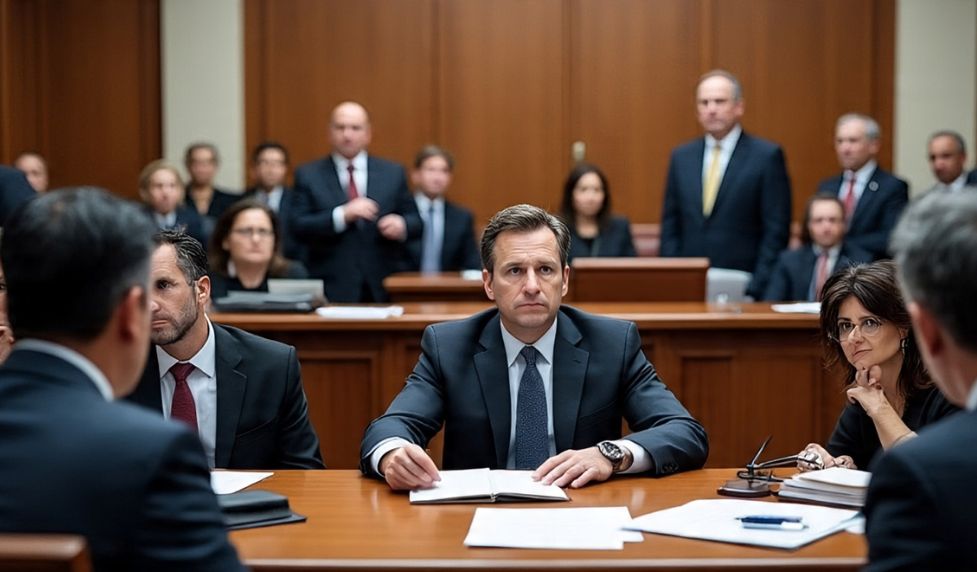A well-known brand in the real estate investment industry, Ashcroft Capital, has recently come under increasing scrutiny as a result of the Ashcroft Capital litigation. The case has generated discussions among investors, industry professionals, and regulatory organizations due to the growing popularity of real estate syndications as alternative investment options. What precisely is happening, though, and what does it signify for investors and the multifamily real estate market as a whole?
This in-depth piece examines the Ashcroft Capital lawsuit’s whole background, including its beginnings, claims, potential consequences, and position within the larger real estate investing trends. Regardless of your background—passive investing, real estate, or simply following legal developments in financial markets—this guide will provide you with a comprehensive perspective.
Ashcroft Capital’s Ascent: An Important Background
Joe Fairless founded Ashcroft Capital, which was soon recognized as a reliable player in the multifamily apartment syndication market after being co-managed with important partners. Their strategy was simple: collect investor funds, buy Class B and C apartment buildings in expanding regions, make value-added improvements, and gradually raise asset values.
The company has managed more than $2 billion in assets throughout the years, mostly in Florida, Georgia, and Texas. Thousands of passive investors were drawn to its flagship investment instrument, the Ashcroft Value-Add Fund.
Before the Ashcroft Capital case started to throw a shadow, the firm was regarded as a model for syndication excellence because of its robust internet presence, informative podcasts, and transparency-driven investor interactions.
Why Was The Ashcroft Capital Lawsuit Started?
The accusations of investor deception, fund mismanagement, and concealed risk exposure are at the heart of the Ashcroft Capital case. Sources familiar with the case point to a number of crucial points of disagreement, even though complete court documents are still secret or awaiting public release:
-
Alleged Inflation of Asset Values: In order to draw in new investors, Ashcroft Capital allegedly exaggerated expected returns and asset performance.
-
Inadequate Risk Disclosure: The company is accused of failing to appropriately communicate risks to current and potential investors during times of economic depression, particularly after 2023 when interest rates rapidly increased.
-
Distribution Mismanagement: According to the lawsuit, distributions were made using funds from new investors rather than income from assets, which is a warning sign in any syndication scheme.
-
Lack of Operational Transparency: Investors allegedly were not informed of major adjustments to management fees, delays in projects, and refinance failures.
If confirmed, these claims might fall under the category of fraudulent misrepresentation, which is a grave violation of the fiduciary obligation in investment management.
The Current Situation And The Legal Timeline
After months of speculation and irate investor comments in forums and social media groups, the Ashcroft Capital lawsuit surfaced in early 2025. Many of Ashcroft’s assets are held in Texas state court, where a class action lawsuit was filed. Ashcroft Capital LLC, its founders, and related legal entities are among the accused.
The case is still in the pre-trial discovery stage as of August 2025. Ashcroft Capital has officially denied any wrongdoing and stated that the allegations are “baseless and without merit.” A verdict has not yet been rendered. According to a spokesperson:
“We are still dedicated to our investors and have faith that the truth will come to light. Although it is a regrettable diversion, we take the Ashcroft Capital litigation seriously and are fully assisting with it.”
Investor Reaction: Fear, Hold Off, Or Join A Lawsuit?
Investor panic has been one of the Ashcroft Capital lawsuit’s most obvious aftereffects, especially for younger investors who are not familiar with the risks of syndication.
Typical Responses Include:
-
Withdrawal Requests: Many investors are trying to leave deals early, even though syndications are inherently illiquid.
-
Legal Consultation: Concerns about general partner (GP) responsibilities and limited partnership (LP) safeguards are becoming more common, according to financial consultants and real estate lawyers.
-
Transition To T-Bills And REITs: Reallocating capital into more regulated, liquid, and lower-risk vehicles is a response to the experience that some investors have had.
A more subdued group of seasoned investors, however, is still holding out because they think the lawsuit might not have an identical effect on all funds. Citing faith in the underlying asset values and the conviction that recent underperformance is due to macroeconomic circumstances rather than poor management, a number have decided not to participate in the class action case.
Effects On The Entire Industry: Is Syndication Losing Its Glow?
The Ashcroft Capital litigation has already had an influence on the industry, regardless of whether it is settled or dismissed. Here’s how:
1. Investors Are Being More Scrutinized
More LPs are demanding comprehensive financial audits, doing more stringent operator due diligence, and declining to make investments in companies that lack a track record of success over several market cycles.
2. GP Accountability
General Partners (GPs) are now expected to provide better communication, more cautious underwriting assumptions, and more transparent risk disclosures under the microscope.
3. Regulators Are Paying Attention
Real estate syndications have traditionally been treated as private offers by the SEC, which has a “hands-off” policy toward them. However, if fraud claims are proven true, high-profile cases like the Ashcroft Capital lawsuit might hasten federal regulation.
Similarities To Other Lawsuits Concerning Real Estate Syndication
There is more to this case than meets the eye. Actually, recent court cases against other well-known multifamily operators are similar to the Ashcroft Capital case.
For instance:
-
Similar claims of fabricated repair budgets and overstated returns led to a 2024 lawsuit against Nightfall Realty Group.
-
In 2023, the SEC began looking into Blue Horizon Capital, another syndication company, for transferring funds improperly.
Legal professionals caution that the results of these parallel instances could establish precedents that impact Ashcroft’s circumstances, even if the company has not yet been formally charged with any crimes or regulatory infractions.
The Ashcroft Capital Lawsuit’s Lessons On Due Diligence
The Ashcroft Capital lawsuit’s emphasis on investor education and due diligence is among its most beneficial features. What potential investors can learn is as follows:
Warning Signs To Look Out For:
-
Excessively optimistic IRR estimates (>20%)
-
Absence of independent property appraisals or audits
-
Absence of prior successful departures
-
Distributions made with little transparency by general partners prior to the creation of cash flow
Questions All Investors Should Pose:
-
How is my return determined and allocated?
-
What presumptions does the operator have regarding rent growth and cap rates?
-
Is it possible to see past investment results in addition to future ones?
Although real estate syndication isn’t always dangerous, the Ashcroft Capital case serves as a reminder that the details matter.
Possible Lawsuit Outcomes: What Comes Next?
The outcome of the current case will have a significant impact on Ashcroft Capital’s future. Here are a few possible outcomes:
Restitution
In class action cases, this is the most typical result. In the event of a settlement, Ashcroft might consent to paying plaintiffs money without acknowledging misconduct. Changes to investor rules and internal controls may also fall under this category.
Complete Trial And Decision
Ashcroft may face multi-million dollar settlements, asset confiscation, or possibly the forced dissolution of some funds if the case goes to trial and he is proven culpable.
Exoneration Or Rejection
In Ashcroft’s best case, the court might conclude that the accusations are not supported by enough evidence. In this scenario, operations could continue more regularly, but reputational rehabilitation would still be challenging.
Restoring Credibility In Syndication For Real Estate
Whatever the outcome, the Ashcroft Capital case has set a turning point for the whole sector. Private equity businesses, financial influencers, and real estate operators now have to adjust to a new level of fiduciary duty, transparency, and conservatism.
Anticipate seeing:
-
Syndication firms have recruited more third-party auditors.
-
More control over LP in transaction structures.
-
Improved data displays and platforms for investor reporting.
-
Campaigns to raise investor literacy through education.
In Summary: The Ashcroft Capital Lawsuit’s Aftereffects
The Ashcroft Capital lawsuit is a turning point for the future of passive real estate investing, not just a court battle. Some see it as a wake-up call, while others see it as an opportunity to innovate and get better.
The lessons learned from this legal battle are priceless, regardless of whether you’re a syndicator trying to regain trust or an investor looking for safer options. One thing is certain despite the uncertainty surrounding Ashcroft Capital’s future: responsibility, openness, and due diligence are now the new norm rather than an alternative.




